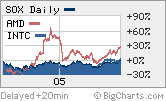 |
| Shares of AMD have had a wild ride during the past year but they have outperformed Intel and other chip peers. |
|
|
|
|
|
|
|
|
|
|
|
NEW YORK (CNN/Money) � Who doesn't love an underdog?
Consider the case of Advanced Micro Devices, the number 2 player in the world of high-end chips used in personal computers and servers.
AMD has been perennially nipping at the heels of arch rival Intel, with little success. According to semiconductor research firm iSuppli, Intel had a whopping 85 percent share of the microprocessor last year compared to just 9 percent for AMD.
Still, AMD, like David, is fighting back against the industry's Goliath. But instead of a slingshot, AMD is using the 21st century equivalent: a lawsuit. AMD filed an antitrust complaint against Intel in a U.S. federal district court last month.
Since then, shares of AMD (Research) have surged nearly 15 percent. Granted, most chip stocks have rallied lately due to expectations of strong second-quarter earnings reports. Intel (Research) is up about 7 percent during the same time frame, as is the Philadelphia Semiconductor Index, which includes Intel and AMD.
So the fact that AMD has drastically outperformed its chip peers in recent weeks seems to be an indication that investors are betting on a favorable outcome, i.e. a large financial settlement from Intel, as a result of the lawsuit.
Too much trust in the antitrust strategy?
But will this really be the case? Antitrust actions have a way of dragging on. Just think of how long the U.S. government's lawsuit against Microsoft lasted.
"The move in stock is a little overdone. There is an expectation that business will improve due to the lawsuit and that's the sole reason that the stock has gone up," said Eric Ross, an analyst with ThinkEquity Partners. "But the case will be heard probably in a year and a half at earliest so I'm having trouble believing that this will have a near-term benefit for AMD."
Others argue that at the very least, AMD will gain some free publicity. "The lawsuit could lead to additional exposure to AMD for investors and customers," said Kevin Rottinghaus, an analyst with FTN Midwest Securities.
But there are other risks associated with the lawsuit. In a recent report, Bernstein analyst Adam Parker noted that the company will have to deal with increased legal fees as well as an expected marketing blitz from Intel.
And Matthew Wilkins, an analyst with iSuppli, said that he's not sure AMD will be able to prove its allegations. In a statement about the lawsuit, AMD said that Intel has "unlawfully maintained its monopoly in the x86 microprocessor market by engaging in worldwide coercion of customers from dealing with AMD."
Wilkins points out, however, that AMD has actually gained market share in the processor market during the past year thanks to innovations with its 64-bit Opteron processor as well as with dual-core technology, which enable a chip to have two microprocessors on it.
"AMD has a lead with dual-core Opterons in servers and workstations and headroom with desktop processors," said Wilkins. "They are doing well, better than they've ever done in microprocessors, so to go and shake up the hornet's nest struck me as a little bit odd."
Stock gains could be gone in a "flash"
So investors that are rushing into the stock might be ignoring some key near-term risks. AMD will report its second-quarter results on Wednesday. Analysts expect a loss of 6 cents a share and a year-over-year decline in sales of nearly 4 percent.
AMD's main problem is that despite the momentum in its microprocessor business, it is losing money in its flash division, a joint venture with Fujitsu called Spansion which makes memory chips used in communications devices.
Spansion filed for an initial public offering earlier this year, raising hopes that AMD will soon be able to rid itself of this unprofitable unit. Rottinghaus said that without Spansion to drag down profits, AMD's processor business could be worth about $22 a share on a standalone basis. That's about 15 percent higher than AMD's current price.
But Ross says that AMD bulls have gotten ahead of themselves since there are still no firm plans for a sale of the unit. "Investors are making big leaps of faith about flash. You can't really separate the businesses until they are separated," said Ross.
Along those lines, AMD's stock looks way too expensive. Following its recent run, shares now trade at about 33 times 2006 earnings estimates -- projections that include Spansion. Intel's stock, on the other hand, trades at a multiple of just 18.
I'm all for rooting on the little guy. But when the industry leader trades at such a substantial discount to a much smaller competitor, it's hard to ignore such a bargain.
For a look at more semiconductor stocks, click here.
For CNN/Money's special coverage of earnings season, click here.
Analysts quoted in this story do not own shares of the companies mentioned and their firms have no investment banking relationships with the companies.
Sign up to receive the Tech Investor column by e-mail.
Plus, see more tech commentary and get the latest tech news.

|